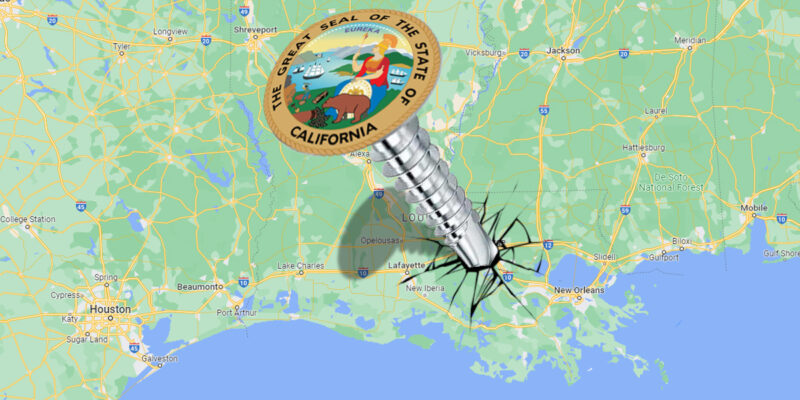What does a lawsuit in San Francisco have to do with jobs in Louisiana? Unfortunately, it could mean everything to the hardworking women and men of our state — and it’s yet another example of frivolous government lawsuits killing jobs and opportunity in the Pelican State.
The state of California recently sued energy producers and manufacturers, alleging they are liable for climate change and billions of dollars in damages. The lawsuit sounds a warning about a dangerous tactic across the United States being deployed by certain states and local governments — from California to Hoboken, N.J.
They are using the court system to set national energy policy and achieve their environmental goals, with Louisiana workers paying the price. It’s also déjà vu for Louisiana, which has already suffered the consequences of baseless government lawsuits against the energy industry.
California’s lawsuit might be the latest government-led attack on the energy industry, but it certainly isn’t new or novel. For nearly 20 years, states and local governments have sued major energy companies, alleging they are responsible for climate change. In Louisiana, which is home to one-fourth of the nation’s energy supply and where the industry employs more than 250,000 citizens, lawsuits like these are disastrous and would spell doom for our state’s comeback.
The legal grounding for climate litigation is on shaky ground, and the Supreme Court has repeatedly struck down similar lawsuits. In the 2011 case of American Electric Power v. Connecticut, Justice Ruth Bader Ginsberg wrote the unanimous opinion and dismissed climate claims brought by eight states and the city of New York, pointing out that legislative bodies are the appropriate venues for climate regulation — not courts. Lower federal courts have also dismissed these kinds of claims.
In 2021, the U.S. Court of Appeals for the 2nd Circuit dismissed New York City’s case, stating that even if the allegations were true, no single entity could be legally liable for global climate change.
But just because a lawsuit is baseless doesn’t mean it is without cost. Unfortunately, Louisiana has first-hand experience with wrongheaded government lawsuits against the energy industry by way of unending coastal lawsuits. Louisiana parishes have sued more than 200 energy companies since 2013, alleging that these companies’ operations from decades ago damaged coastal marshes and wetlands.
In reality, the lawsuits were nothing more than a frivolous attack waged by a small group of ambitious, well-funded attorneys against a seemingly deep-pocketed industry. But make no mistake, these lawsuits weren’t a fight between a small state and “Big Oil.” Of the companies targeted, most of them were small and independent operators, and more than 33,000 workers were employed by these companies.
When governments sue our job creators to score political points for their constituencies, it is our workers and communities that will pay the price. A 2019 Pelican Institute study found that the coastal lawsuits had a direct impact on Louisiana’s economy, resulting in a loss of between $44 million and $113 million each and every year since the coastal lawsuits were filed in 2013. At least 2,000 jobs were lost over a two-year period when the lawsuits were first filed, equating to $70 million in lost earnings for Louisiana workers—all directly tied to the lawsuits.
Advertisement
Ironically, the lawsuits that were brought by the government also hurt Louisiana governments. As offshore drilling declined by more than 50% since 2013, state and local governments lost at least $22.6 million per year in industry royalties. Again, it’s citizens who suffer, as there is less money for schools, roads and other infrastructure; in some cases, working families saw increased taxes to offset these losses.
If we aim to reduce emissions, innovation and the free market are the better path. For example, the transition to natural gas has been one of the most successful ways to lower carbon emissions. According to the Energy Information Administration, the transition from coal to natural gas has led to a reduction of carbon emissions by 32% from 2005 to 2019.
Louisiana is uniquely positioned to lead the way for the nation and the world. Compared with other states, Louisiana has the third-most natural gas production, fifth-most-proved natural gas reserves, and about 10% of the total marketed natural gas production.
Louisiana’s experience with frivolous government lawsuits against the energy industry is a cautionary tale for the nation. States and local governments should heed this lesson. Using the court system to extract money from energy companies and set national energy policy could set a dangerous precedent and have a painful price tag, especially in Louisiana, where energy operations support nearly one out of every nine jobs in our state.
We would be much better off maximizing the clean resources we have and working with companies that can invest in innovation, hire employees — our fellow citizens — and provide wages and tax dollars for our communities.
Daniel J. Erspamer is the CEO of the The Pelican Institute for Public Policy
Advertisement
Advertisement

